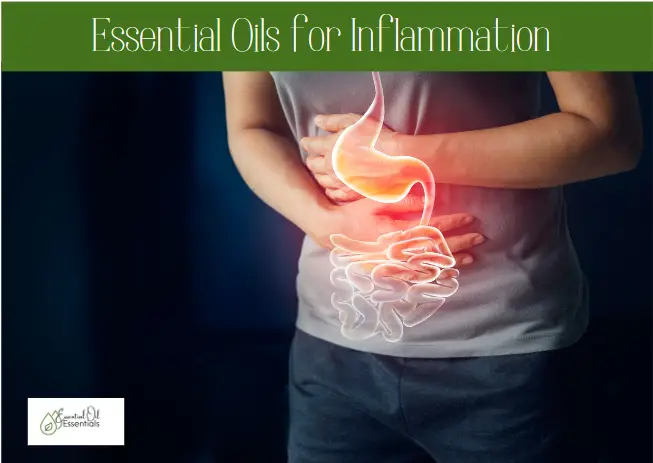8 Best Essential Oils for Gut Health in 2022
When most people think about keeping their body healthy, they focus on things like eating right, exercising, and getting enough sleep. But what many people don’t realize is that the health of your gut is just as important, if not the MOST important. And this post is ALL about the best essential oils for gut health!
Research shows that the gut may play a role in everything from weight control to moods and cognitive function.
The gut is a delicate ecosystem that acts as the body’s second brain. It is home to trillions of bacteria, viruses and other microbes which help digest food, fight off infections and regulate blood sugar levels. The microbiome in your gut can also play an important role in mental health by influencing how you process stress and anxiety.
Luckily, there are some simple ways to improve gut health – and essential oils can be one of them. Keep reading to learn more about the 8 best essential oils for gut health!
What Can Cause Gut Problems?
There are various reasons why gut health could be compromised, including a lack of dietary fiber, low stomach acid production, chronic stress and food sensitivities.
Below are the 4 main problems that can cause an unhealthy gut.
1. Overuse of Antibiotics
According to the Centers for Disease Control and Prevention
Up to one-third to one-half of antibiotic use in humans is either unnecessary or inappropriate. Each year in the United States, 47 million unnecessary antibiotic prescriptions are written in doctor’s offices, emergency rooms, and hospital-based clinics, which makes improving antibiotic prescribing and use a national priority.
The overuse of antibiotics can have a negative impact on your gut health. For example, when you take an antibiotic for a bacterial infection, the medication kills off all bacteria in your body including those that help maintain a healthy balance in the intestines. When these beneficial bacteria are gone, bad bacteria such as Clostridium difficile (C-diff) may grow unchecked and produce toxins that lead to diarrhea and inflammation of the colon. This is often due to long term use of antibiotics.
How to Prevent Antibiotic Side Effects:
- Take probiotics before or after taking an antibiotic
- Drink lots of fluids with meals, especially water
- Eat foods high in fiber like vegetables and whole grains
- Avoid sugary snacks
- Get plenty of rest
- Exercise regularly
2. The Standard American Diet
Processed foods and sugar are two of the worst offenders when it comes to gut health. Consuming processed foods and sugars on a regular basis can lead to an imbalance in the gut flora, which can cause all sorts of problems such as indigestion, constipation, diarrhea, and even obesity.
Sugar is particularly harmful to gut health because it feeds the bad bacteria in the gut, leading to an overgrowth of these harmful microbes. This can cause inflammation and damage to the delicate lining of the gut, which can lead to a host of other problems such as leaky gut syndrome.
In fact, a study showed that a diet high in sucrose and fructose (table sugar) affects the composition of beneficial bacteria responsible for processing vegetables. This in turn could impact necessary nutrient and vitamin absorption.
Processed foods are also terrible for gut health because they are often high in additives and chemicals that can damage the gut lining. These foods can also contain additives and preservatives that can disrupt the delicate balance of gut flora.
So, if you’re looking to maintain a healthy gut, it’s best to avoid processed foods and sugar as much as possible.
Instead, focus on eating plenty of fresh fruits, vegetables, and whole grains.
3. Stress
Stress is a normal part of life. It can be caused by many things, including work deadlines, family problems, or money woes. However, too much stress can lead to all kinds of health problems – from headaches and stomachaches to depression and heart disease.
But did you know that stress can also reshape the gut bacteria’s composition? That’s because there are hormones in the body that affect how our intestines function – and these hormones are influenced by stress! This means that when we’re under pressure, we’re more likely to experience digestive system changes like diarrhea or constipation – and even an upset stomach.
Furthermore, it appears that high levels of chronic stress may even change which types of bacteria live in our intestines!
So, if you’re constantly feeling stressed out, it’s important to find ways to reduce your stress levels.
4. Exposure to Toxins
Part of the problem is that many people are exposing themselves to toxins without realizing it. From pesticides on non-organic produce to chemicals found in plastic containers or household cleaning products, toxins are everywhere!
These substances may interfere with the gut’s natural processes for regulating immunity, moods, digestion and more. Eliminating these toxins from our lives can be difficult because they are often hidden sources of contamination but there’s no question about how much better we feel when we take the necessary steps to reduce our exposure.
Ingredients in processed foods, gluten, artificial sweeteners, GMOs all make our guts work harder than they should have to. While some people seem to be able to eat whatever they want without consequence, for others these foods cause inflammation and other digestive problems.
Best Essential Oils for Gut Health
One way to do this is by using essential oils. Essential oils are concentrated extracts of plants that have healing properties. And when it comes to gut health, some of the best oils to use are those that have a calming effect on the body. Some of these oils include lavender, chamomile, and frankincense. You can diffuse them in your home or office, or add them to a bathtub or massage oil. Alternatively, you can put a few drops of oil on a cotton ball and sniff it when you’re feeling stressed out. By using essential oils for gut health, you can help keep your digestion on track
Clove
Clove essential oil is a powerful antioxidant, anti-inflammatory and antimicrobial agent. It helps to stimulate the immune system, promote healthy digestion and relieve pain from arthritis.
The compound eugenol, which is found in clove oil, has been shown to help kill harmful bacteria and parasites that can cause gut problems such as diarrhea, constipation and nausea. It has also been shown to support the gut lining when eating too many acidic foods that might destroy it.
Clove oil can be diluted with a carrier oil and applied directly to the abdomen or added to a warm bath. It can also be used in aromatherapy by inhaling a diluted mix with water!

Peppermint
Peppermint oil is a natural essential oil that has been used for centuries to help with a variety of health issues. One such use is to help maintain gut health.
Peppermint oil contains menthol, which helps to soothe the stomach and intestines. It also helps to improve digestion and can be helpful in relieving symptoms of IBS and other digestive issues.
A study was conducted in which 57 participants with IBS were given either a placebo or peppermint oil enteric-coated capsules twice daily. After 4 weeks, participates who took the peppermint oil showed improved in abdominal symptoms associated with IBS.
Adding peppermint oil to your daily routine can help keep your gut healthy and functioning properly. It is a safe and natural way to improve your digestion and reduce stomach discomfort. So if you’re looking for a way to help support your gut health, consider adding peppermint oil to your regimen.

Fennel
Fennel essential oil is a natural remedy that has been used for centuries to maintain gut health. The oil is extracted from the fennel plant, and it has a host of beneficial properties that help to keep your digestive system functioning properly.
Fennel oil contains compounds called anethole and fenchone, which have anti-inflammatory and antispasmodic effects. These compounds help to soothe the gut and reduce inflammation, which can lead to better digestion and improved gut health.
There’s also a great deal of eugenol, so it naturally soothes the digestion system!
To use fennel, it’s recommended to stick with aromatherapy or add it to the skin topically, diluted of course.

Cardamom
Cardamom is a unique essential oil that has a variety of uses. It is best known for its ability to help maintain gut health, but it also has anti-inflammatory and antispasmodic properties. it has been associated with many digestive health benefits, to include relief from indigestion and constipation.
One of its unique features is its ability to maintain a healthy balance between good and bad bacteria in the gut! It can inhibit growth of the two bacteria that typically cause abdominal pain, gas, diarrhea and nausea. Say goodbye to Heliocabacter pylori and Campylobacter!

Tea Tree and Oregano
The two of these essential oils used together make up one big antimicrobial powerhouse. They are typically used in DIY cleaning products due to their super cleaning power.
The two of these used together will help keep a balance between good and bad bacteria in the gut!
Organo contains a compound called carvacrol, which helps promote intestinal integrity and healthy immune response. It also has the power to help repair the gut lining!
Thyme and Rose
Using these two essential oils together will ensure a healthy balance of bacteria in the gut!
Thyme essential oil is excellent at helping to prevent gas forming in the intestines and stomach. It also acts as a detoxifier, removing toxins, salt, and excess water from the body.
A study found that thymol and geranio, the main compounds in thyme and rose “could be effective in suppressing pathogens in the small intestine, with no concern for beneficial commensal colonic bacteria in the distal gut.”
Want these recipes PLUS more on a Printable you can easily refer too?

How to Use Essential Oils for Gut Health
You can use essential oils for gut health internally, topically, or just by inhaling. Here are a few different recipes to try out!
To promote healthy digestion
Ingredients:
- 5 ml raw honey
- 5 ml carrier oil (coconut or sweet almond oil)
- 20 drops essential oils of your choice (Clove, Orange, Cinnamon, Rosemary, Eucalyptus, Lemon)
Instructions:
- Mix all oils and honey together
- Stir in 2 drops of this digestion blend into tea, water, or coffee. Or take directly
Feeling Nauseous?
RECIPE #1
Ingredients:
- 3 drops ginger essential oil
- 2 drops lemon essential oil
- 10 ml carrier oil such as coconut (optional)
Instructions
- For diffusing, blend the essential oil drops into 100 ml of water and breathe in the aroma!
- For applying topically, blend the essential oil drops into 10 ml coconut carrier oil and apply to the stomach area topically.
- Tip: If applying topically, use a 10 ml roller!
RECIPE #2
Ingredients
- 3 drops peppermint essential oil
- 2 drops ginger essential oil
- 10 ml carrier oil such as coconut (optional)
Instructions
- For diffusing, blend the essential oil drops into 100 ml of water and breathe in the aroma!
- For applying topically, blend the essential oil drops into 10 ml coconut carrier oil and apply to the stomach area topically.
- Tip: If applying topically, use a 10 ml roller!






